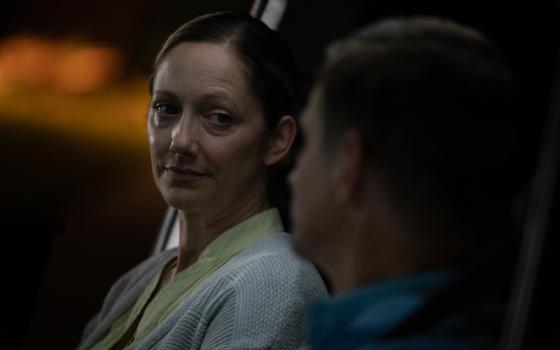On this day, 75 years ago, a Solemn Requiem Mass was sung at Westminster Cathedral for the repose of the soul of Gilbert Keith Chesterton.
Visits to Lourdes and Lisieux earlier that spring had not helped, and on June 14, 1936, G. K. Chesterton died.
"The then Parish Priest, Monsignor Smith, gave him the last Sacraments and as he lay dying in Top Meadow, Grove Road. Fr Vincent McNabb, O.P., kissed the pen with which he had written so many noble words and sang the Salve Regina, as is the custom in the Dominican Order."
-- "Gilbert Keith Chesterton (1874-1936)", Church of St. Teresa, Beaconsfield.
G. K. Chesterton's sister-in-law, Ada Chesterton, widow of his brother, Cecil, wrote about how difficult it was to get the enormous coffin down the stairs of Top Meadow. A funeral Mass was said at St. Teresa's, and Chesterton was buried in the cemetery in Shepherd's Lane, Beaconsfield.
Because Chesterton's wife, Frances, had kept his illness from the press and from his friends, it was a shock to everyone when he died, and many people were unable to attend the funeral, so it was decided to hold the memorial requiem on June 27.
"But if, predictably, nothing done by poor Frances in despised Beaconsfield met with [Ada's] approval, the requiem Mass that was celebrated in Westminster Cathedral on Saturday 27 June delighted her. 'The pageantry, the tumult, the trumpetings of his genius were made manifest,' and Ronald Knox 'preached one of the most eloquent valedictories the building can have heard'."
--G. K. Chesterton: A Biography, by Ian Ker, Oxford University Press, 2011, page 726.
"On Saturday, 27 June, a memorial requiem mass was celebrated at Westminster Cathedral with a congregation of about 2,000 people. Cardinal (then Archbishop) Hinsley had requested that Monsignor John O'Connor sing the mass, assisted by Father Ignatius Rice, who had been O'Connor's assistant at Chesterton's reception into the Church. Father Vincent McNabb also assisted as sub-deacon. This was a fitting tribute, not only to Chesterton but also to Monsignor O'Connor, whose friendship with Gilbert had spanned more than three decades. It was Father Brown's crowning glory."
(Chesterton based the fictional detective, Father Brown, on Father O'Connor.)
"O'Connor described the requiem at Westminster as 'the solemn commemoration of him by and for those who could not be present at Beaconsfield at his burial, myself for instance having been confined to bed all that week'. He also heard on the day at Westminster that Wells had said that if he ever got to Heaven, 'presuming there is a Heaven, it will be by the intervention of Gilbert Chesterton'.
"The panegyric at Westminster was preached by Monsignor Ronald Knox, but the highest honour came in the form of a message from the Pope. Both Frances and Cardinal Hinsley received telegrams from Cardinal Pacelli for and on behalf of Pope Pius XI. (Pacelli was later destined, as Pius XII, to be the Pope's successor.) The telegram to Cardinal Hinsley was read to the vast crowd in the cathedral and found an echo in the hearts of all those present: 'Holy Father deeply grieved death Mr Gilbert Keith Chesterton devoted son Holy Church gifted Defender of the Catholic Faith. His Holiness offers paternal sympathy people of England assures prayers dear departed, bestows Apostolic Benediction.'"
--Wisdom and Innocence: A Life of G. K. Chesterton, by Joseph Pearce, Hodder & Stoughton, 1996. pages 484-485.
Click http://tinyurl.com/6golj56> here to read the "Panegyric delivered at the Memorial Requiem Mass at Westminster Cathedral, June 27, 1936," by Monsignor Ronald Arbuthnot Knox.
Seventy-five years have passed since that requiem with Knox in the pulpit, Belloc in the congregation, and McNabb in a dalmatic. What do we remember now of those once-famous men, and what do we think today of G. K. Chesterton? There are some who would like to see him canonized. For others, his work does not hold up, and his political and social views are repellent.
Chesterton "is a difficult writer to defend. Those of us who are used to pressing his writing on friends have the hard job of protecting him from his detractors, who think he was a nasty anti-Semite and medievalizing reactionary, and the still harder one of protecting him from his admirers, who pretend that he was not".
--"The Back of the World: The Troubling Genius of G. K. Chesterton", by Adam Gopnik, The New Yorker, July 7, 2008. (Subscribers may access the article. In this unfavorable comment about it in The Atlantic, available to all, Ross Douthat quotes an important passage.)
"The Paradox Who Was Chesterton", by A. N. Wilson, TLS, January 28, 2009, is a review of Chesterton and the Romance of Orthodoxy: GKC, 1874-1908, by William Oddie, Oxford University Press, 2009. The two men quibble about various matters, including whether or not "Chesterton had a strong general tendency to hero-worship". The customer comments on the Amazon pages for the Oddie book and the Ker book demonstrate further the conflicting opinions and the confusion about Chesterton.
Click here for some images of Chesterton.
Click here for a YouTube of Chesterton at Holy Cross College in Worcester, Massachusetts, in 1930. His comment at the end is interesting.
Many of Chesterton's books are free for Kindle users.

